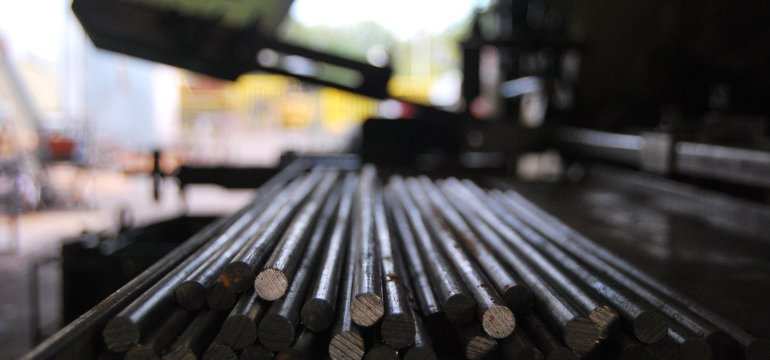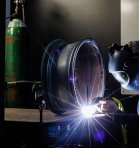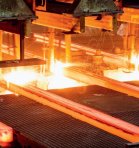Nowadays, rapidly developing technology and the increasing demands of industry are forcing us to look for newer and more advanced materials. One such material is titanium steel. Although it is not widely known and used on a large scale in everyday life, its unique properties make it widely used in specialized fields. In this article, we will look at the advantages and applications of titanium steel, while highlighting its role in the Polish industry.
Physical and chemical properties of titanium steel
Titanium steel is a unique alloy with an unusual combination of strength, lightness and corrosion resistance. Compared to traditional steels, which contain iron and carbon, titanium steel has an admixture of titanium, which gives it its characteristic properties. Titanium steel is three times stronger than ordinary iron, but at the same time about 45% lighter. This makes it widely used in the aerospace industry, as well as in medicine.
Mechanical strength: One of the most important advantages of titanium steel is its high mechanical strength. It can withstand extreme pressures and stresses without cracking, which is crucial in engineering applications.
Corrosion resistance: Titanium steel is highly resistant to corrosion, especially in acidic and alkaline environments. This resistance makes it excellent for use in the chemical and marine industries.
Low density: Lightweight yet strong, titanium steel allows for a reduction in component weight, which is extremely important in the aerospace industry. Less weight translates into lower operating costs and better performance.
Heatresistance: Titanium steel retains its mechanical properties even at extremely high temperatures, which is important in the automotive and energy industries.
Experts from the Institute of Metallurgy and Materials Science and Engineering of the Polish Academy of Sciences in Krakow indicate that interest in titanium steel is growing worldwide , making Poland also an important player in this market. These trends are evident in both the industrial and academic sectors.
Aerospace industry: irreplaceable lightness and strength
Titanium steel has gained significant recognition in the aerospace industry. The characteristics of this material, such as lightness and strength, are crucial in sectors where minimizing weight and maximizing strength are key to success.
Aircraft support structures: In aircraft, any additional weight translates into higher fuel consumption. That's why titanium steel is used to manufacture support structures, reducing aircraft weight and fuel consumption.
Heat shields in space shuttles: Titanium is also used for heat shields in space shuttles, which must withstand extreme temperatures during entry and exit from Earth's atmosphere.
Aircraft engine components: Parts made of titanium steel are used in jet engines because of their high fatigue strength and corrosion resistance.
An expert from the Warsaw University of Technology, Wojciech Ziolkowski, Ph.D., stresses that titanium steel is a key material for dosing strength in the most vulnerable areas, which dramatically increases flight safety and efficiency.
Medical industry: biocompatibility and durability
Titanium steel also plays a very important role in the medical industry. Its biocompatibility, that is, its ability to function in the body without causing allergic reactions or rejection, is the basis for its widespread use in various medical fields.
Endoprostheses: The most common use of titanium steel in medicine is in the manufacture of hip and knee endoprostheses. Its high resistance to corrosion and mechanical wear guarantees the long-term performance of the implants.
Surgical equipment: knives, tweezers, needles and other surgical instruments made of titanium steel are characterized by higher durability and resistance to various chemicals used during sterilization.
Bone screws and stabilizing plates: In orthopedics, titanium steel is used for bone screws and stabilizing plates, which patients can wear for long periods of time without the risk of allergic reactions.
According to Dr. Anna Kowalczyk, a biomaterials specialist at the Medical University of Lodz, titanium steel will play an increasingly important role in regenerative medicine and reconstructive surgery due to its unique biocompatibility and strength properties.
Chemical and marine industries: resistance to hostile environments
One of titanium steel 's most important properties is its exceptional corrosion resistance, making it an ideal material for use in industries with aggressive chemical or marine environments.
Chemical tanks: titanium steel is used for tanks that store aggressive chemicals, which can lead to corrosion of conventional steels. This makes the tanks more durable and safe.
Ships and oil rigs: In the marine industry, titanium steel is used to build ship hulls, as well as elements of oil rigs. Its resistance to seawater benefits the longer life of these structures.
Pipelines in the petrochemical industry: Pipelines and valves made of titanium steel are more resistant to the harsh conditions found in the petrochemical industry.
The Institute of Industrial Chemistry in Warsaw indicates a growing interest in titanium steel in the chemical industry in Poland, where increasing emphasis is being placed on the durability and safety of installations.
Automotive and sport industries: high performance and innovation
Titanium steel is also gaining popularity in the automotive and sports industry, where the material's lightness and strength translate into better performance and innovative solutions.
Sports car components: In automotive applications, titanium steel is used for key components such as suspensions, exhaust systems and rims, which reduces the weight of the car and improves its performance.
Sports equipment: In sports, titanium steel is used in the manufacture of bicycles, golf clubs, tennis racquets and other sports equipment components, providing them with lightness and strength.
Motorcycles and bicycles: A frame made of titanium steel is lightweight yet strong, making it ideal for motorcycles and mountain bikes.
Andrzej Nowak, a materials expert at the Silesian University of Technology, stresses that the development of technologies and materials such as titanium steel is stimulating innovation in the automotive and sports industry, which has a positive impact on the quality and performance of end products.
Summary
Titanium steel is a material with unique properties that is used in many industries. Its strength, corrosion resistance, low density and biocompatibility make it an indispensable material in the aerospace, medical, chemical, automotive and sports industries. Thanks to the growing interest in titanium steel in Poland, both industry and scientific research are developing, allowing the material to be used more and more widely. Experts agree that the future of titanium steel is promising, and its applications will continue to expand, bringing benefits to the economy and quality of life. Readers interested in the topic will certainly watch with interest for further innovations and discoveries related to titanium steel.

















